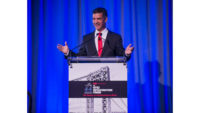The New York Metropolitan Transportation Authority is facing its worst budget crisis in 30 years -- and it will only get worse if a six-year transportation bill waiting to be reauthorized is cut as the Obama Administration vows to rein in domestic spending, said its chairman and CEO.
Jay Walder, who rejoined the agency last July after a 19-year stint in London, asked attendees at a New York Building Congress luncheon Jan. 28 to approach him directly with ideas about how the MTA can simplify its "risky, cumbersome" contracting process, described as the "MTA premium" by the industry.
"Come to me with your ideas about how to change the process," he urged. "Tell us how we'll save money. We'll share those savings with you."
He vowed to fight against any public or political pressure to use capital program dollars to pay for short-term operating costs, and that "every capital dollar is used wisely." He recalled the 1970s, when the New York City subways were a national symbol of urban decay. "I will not let us go down that road again," he said. "We must finish the projects we started. If they stop, they will never be started again."
Such projects, like the $7.2-billion East Side Access, the $1.4-billion Fulton Street Transit Center and the $4.4-billion first phase of the Second Avenue Subway are already experiencing schedule and cost overruns. "We have to end this cycle," Walder said. "They've become an accepted way of doing business."
The MTA will thoroughly review all its projects and re-submit a new five-year capital plan to Albany, he said. "We will fight for the final three years of funding."
The MTA faces a $10-billion gap in its planned five-year capital program.
Albany last year granted emergency funds for two years, but if the six-year federal transportation bill is scaled back, that gap could grow to $13 billion, Walder warned.
Among Walder's other goals are elimination of the "fiefdoms" among the MTA's various branches operating subways, commuter rail, bridges and tunnels. "We have 92 different phone numbers and five different call centers," he noted. "That's 5,000 people doing administrative tasks. It's inefficient."
He also said the MTA needs to stop coming up short of its DBE goals and to stop building any project that doesn't reduce operational costs.
None of this will be easy. "It will be painful," he acknowledged. "There will be layoffs."
The MTA recently eliminated discounted fares for students and is contemplating eliminating some subway and bus lines. A full report on planned changes at the MTA is available at http://www.mta.info/news/




Post a comment to this article
Report Abusive Comment